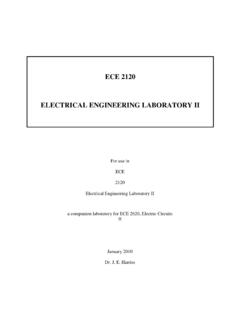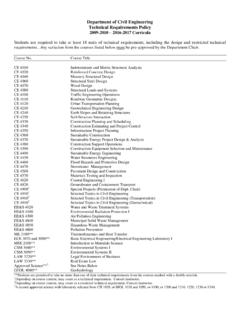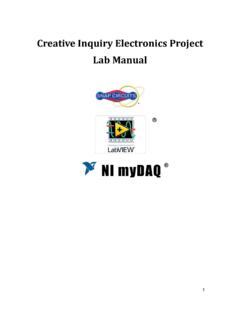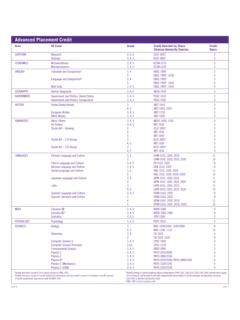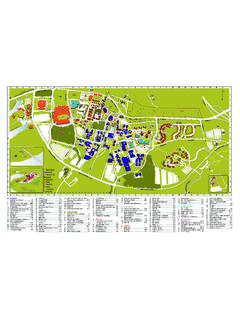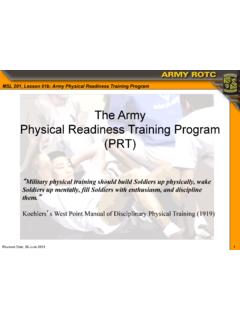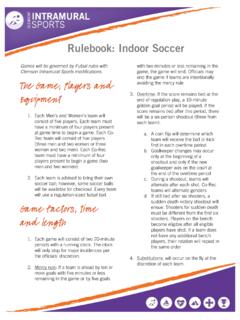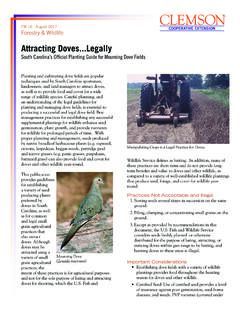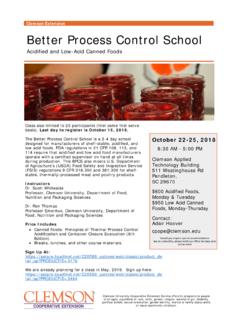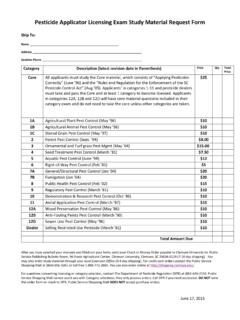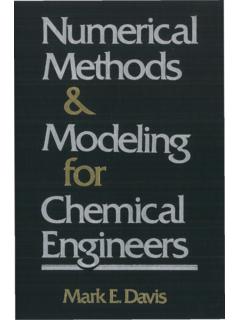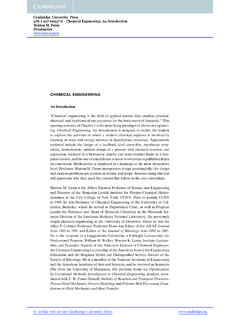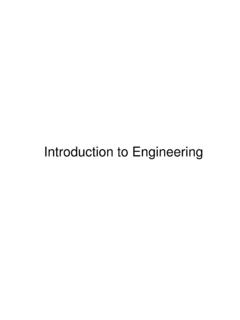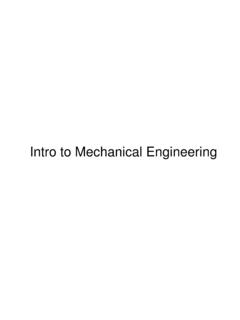Transcription of Chemical Engineering - Clemson University
1 Chemical Engineering CHE 1300 - introduction to Chemical Engineering 3 Credits (3 Contact Hours) Tools and methods for analyzing Engineering problems with applications in Chemical and biochemical processes, including development of process flow diagrams, numerical methods, graphing, and applied statistics. Problem-solving and computer skills are developed in the lecture and laboratory activities. Preq: CH 1010 and either ENGR 1020 or ENGR 1060, each with a C or better. Preq or concurrent enrollment: MATH 1060 or MATH 1070; and PHYS 1220. CHE 1990 - Creative Inquiry in Chemical and Biomolecular Engineering 1-4 Credits (1-4 Contact Hours) In consultation with and under the direction of a faculty member, students pursue scholarly activities individually or in teams.
2 These creative inquiry projects may be interdisciplinary. Arrangements with mentors must be established prior to registration. To be taken Pass/No Pass only. May be repeated for a maximum of eight credits. Preq: Consent of faculty member/mentor. CHE 2110 - Mass and Energy Balances 4 Credits (3 Contact Hours) introduction to fundamental concepts of Chemical Engineering , including mass and energy balances, PVT relationships for gases and vapors, and elementary phase equilibria; problem-solving and computer skills are developed in lab. Preq: CH 1020 and MATH 1080 and PHYS 1220 and CHE 1300. Coreq: CHE 2111.
3 CHE 2111 - Mass and Energy Balances Laboratory 0 Credits (2 Contact Hours) Non-credit laboratory to accompany CHE 2110. Coreq: CHE 2110. CHE 2200 - Chemical Engineering Thermodynamics I 3 Credits (3 Contact Hours) Topics include first and second laws of thermodynamics, ideal gases, PVT properties of real fluids, energy balances with Chemical reactions, and thermodynamic properties of real fluids. Preq: CHE 2110 and MATH 2060. CHE 2300 - Fluids/Heat Transfer 4 Credits (3 Contact Hours) General principles of Chemical Engineering and study of fluid flow, fluid transportation, and heat transmission. Special emphasis is placed on theory and its practical application to design.
4 Preq: CHE 2110. Preq or concurrent enrollment: CHE 2200 and MATH 2060. Coreq: CHE 2301. CHE 2301 - Fluids/Heat Transfer Laboratory 0 Credits (2 Contact Hours) Non-credit laboratory to accompany CHE 2300. Coreq: CHE 2300. CHE 2990 - Creative Inquiry in Chemical and Biomolecular Engineering 1-4 Credits (1-4 Contact Hours) In consultation with and under the direction of a faculty member, students pursue scholarly activities individually or in teams. Projects may be interdisciplinary. Arrangements with mentors must be established prior to registration. To be taken Pass/No Pass only. May be repeated for a maximum of eight credits.
5 Preq: Consent of faculty member/mentor. CHE 3000 - Honors Seminar 1 Credits (1 Contact Hours) Acquaints students enrolled in the Departmental Honors Program with current research issues in the profession. This assists the student in preparing a research proposal for the Senior Thesis. To be taken Pass/No Pass only. Preq: CHE 2200 and CHE 2300; and admission to departmental honors program. CHE 3070 - Unit Operations Laboratory I 3 Credits (2 Contact Hours) Laboratory work in the unit operations of fluid flow, heat transfer, and evaporation. Stress is on the relation between theory and experimental results and the statistical interpretation of those results and on report preparation and presentation.
6 Preq: CHE 2200 and CHE 2300. Coreq: CHE 3071. CHE 3071 - Unit Operations Laboratory I Laboratory 0 Credits (3 Contact Hours) Non-credit laboratory to accompany CHE 3070. Coreq: CHE 3070. CHE 3190 - Engineering Materials 3 Credits (3 Contact Hours) introduction to the fundamental properties and behavior of Engineering materials emphasizing polymers, metals, ceramics, and composite materials. Preq: CHE 2110. Preq or concurrent enrollment: CH 2230 and CHE 2200. CHE 3210 - Chemical Engineering Thermodynamics II 3 Credits (3 Contact Hours) Continuation of CHE 2200. Topics include thermodynamics of power cycles and refrigeration/liquefaction, thermodynamic properties of homogeneous mixtures, phase equilibria, and Chemical reaction equilibria.
7 Preq: CHE 2200 and MATH 2080. CHE 3300 - Mass Transfer and Separation Processes 4 Credits (3 Contact Hours) Study of mass transport fundamentals and application of these fundamentals to separation technologies, with emphasis on gas absorption, stripping, distillation, and liquid-liquid extraction. Preq: CHE 2200 and CHE 2300. Preq or concurrent enrollment: CHE 3210. Coreq: CHE 3301. CHE 3301 - Mass Transfer and Separation Processes Laboratory 0 Credits (2 Contact Hours) Non-credit laboratory to accompany CHE 3300. Coreq: CHE 3300. CHE 3530 - Process Dynamics and Control 3 Credits (3 Contact Hours) Mathematical analysis of the dynamic response of process systems.
8 Basic automatic control theory and design of control systems for process applications. Preq: CHE 2300 and MATH 2080. Preq or concurrent enrollment: CHE 3300. CHE 3950 - Honors Research I 3 Credits (9 Contact Hours) Individual research under the direction of a Chemical Engineering faculty member. Preq: CHE 3000. CHE 3990 - Creative Inquiry in Chemical and Biomolecular Engineering 1-4 Credits (1-4 Contact Hours) In consultation with and under the direction of a faculty member, students pursue scholarly activities individually or in teams. These creative inquiry projects may be interdisciplinary. Arrangements with mentors must be established prior to registration.
9 May be repeated for a maximum of eight credits. Preq: Consent of faculty member/mentor. CHE 4010 - Transport Phenomena 3 Credits (3 Contact Hours) Mathematical analysis of single and multidimensional steady-state and transient problems in momentum, energy, and mass transfer. Both the similarities and differences in these mechanisms are stressed. Preq: CHE 3300 and MATH 2080. This 4000-level course has a 6000-level counterpart. Students should refer to the Graduate Announcements for the 6000-level description and requirements. CHE 4070 - Unit Operations Laboratory II 3 Credits (1 Contact Hours) Continuation of CHE 3070 with experiments primarily on the diffusional operations.
10 Additional lecture material on report writing and general techniques for experimental measurements and analysis of data, including statistical design of experiments. Preq: CHE 3070 and CHE 3300. CHE 4071. CHE 4071 - Unit Operations Laboratory II Laboratory 0 Credits (6 Contact Hours) Non-credit laboratory to accompany CHE 4070. Coreq: CHE 4070. CHE 4120 - Polymer Engineering 3 Credits (3 Contact Hours) Design-oriented course in synthetic polymers. Topics include reactor design used in polymer production, effect of step versus addition kinetics on reactor design, epoxy curing reactions, polymer solubility, influence of polymerization and processing conditions on polymer crystallinity.
